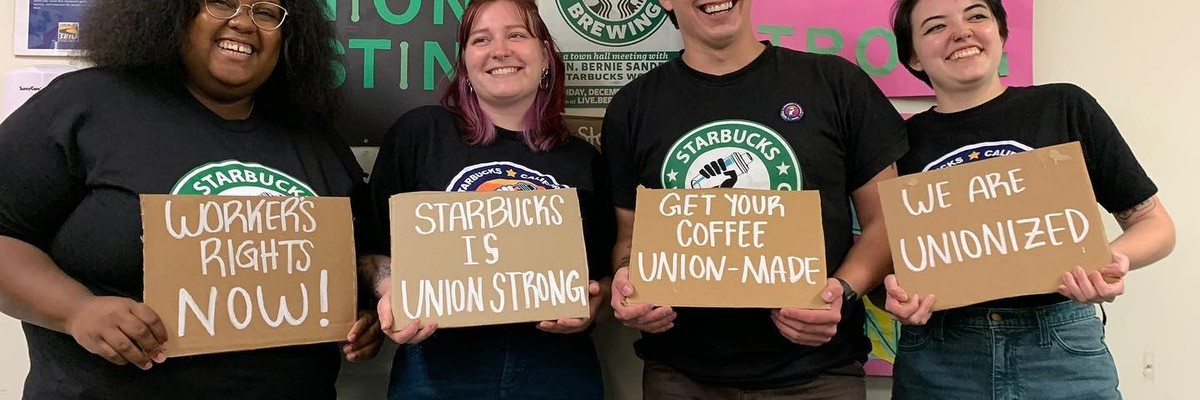Saddled with student debt and, in many cases, spending the early years of their professional lives working during the Covid-19 pandemic, members of Generation Z are proving to be the most pro-worker generation in the United States today, according to recent research.
As Marketplacereported Tuesday, although union membership in the U.S. as of 2021 had fallen to about half the rate seen in the early 1980s, when the Bureau of Labor Statistics (BLS) began tracking unionized workplaces, approval of labor unions among Americans has gone up steadily in the last several years.
Gallup reported last year that 71% of Americans now approve of labor unions, up from 64% before the pandemic. According to a poll released in October by the Center for American Progress (CAP), 64.3% of Generation Zers—born between 1997 and 2012—approve of unions, while 60% of Millennials support them and the mean approval rating among Baby Boomers and Generation X hovers around 58%.
Aurelia Glass, author of CAP's report on the poll, noted that Gen Zers not only back unions more than older generations today, but are "more supportive than Gen Xers and baby boomers were at our age."
"Gen Z is the most pro-union generation alive in America today," Glass told Marketplace.
The reporting comes more than a year into a nationwide unionization push at Starbucks, led by workers including Jaz Brisack, who is in her mid-20s and who the National Labor Relations Board (NLRB) found last week had been illegally forced out of her job by the coffee chain, and Michelle Eisen, who is in her late 30s. Other young labor leaders who have emerged during the pandemic include Christian Smalls, who was fired from his job at an Amazon warehouse in 2020 and went on to form the Amazon Labor Union, leading his former coworkers to vote in favor of forming the retail giant's first union last year.
The unionization push—which includes workers from across generational divides—comes as corporate profits and executive compensation have skyrocketed, with the wage gap between CEOs and workers jumping to 670-to-1 in 2021 from 604-to-1 the previous year.
Meanwhile, noted Marketplace on Tuesday, many members of Generation Z "don't earn enough to afford basic expenses—rent, health insurance, student loan payments—all at the same time," making them more likely to support forming collective bargaining units that would allow workers to negotiate higher wages and better benefits.
"Some analyses show that in the U.S., Gen Z have about 86% less buying power than Baby Boomers did at the same age," reported the BBC in October.
The student loan crisis has contributed to that, with Generation Z members holding $20,900 in student debt of as June 2022, according to the Federal Reserve Bank of St. Louis—13% more than Millennials.
"Living with record levels of student debt, they're also a generation that's more educated, in some cases having earned multiple credentials," Jennifer Sherer, senior state policy coordinator for the Economic Policy Institute, told Marketplace, "and [are] then finding themselves making lower wages than prior generations or not seeing opportunities to advance in their careers."
Gen Zers have also observed a decline in economic wellbeing among older generations, Kate Bronfenbrenner, director of labor education research at the Cornell University School of Industrial and Labor Relations, told the outlet.
Since the early 1980s, when union membership stood at 20.1%, workers' wages have grown by 17.5% while productivity skyrocketed by more than 61%. Home ownership has also declined, with the rate among millennials about 8% lower in 2020 than it was for Generation X and Baby Boomers when they were in the same age group. Student debt and high living costs have been identified as a factor in the decline.
"Young people see that their parents are worse off than their grandparents. They're worse off than their parents," Bronfenbrenner told Marketplace. "They recognize that their lives have been impacted by the decline in unions, that the world was better off when there were more unions and they would have had more opportunities if there were more unions."

